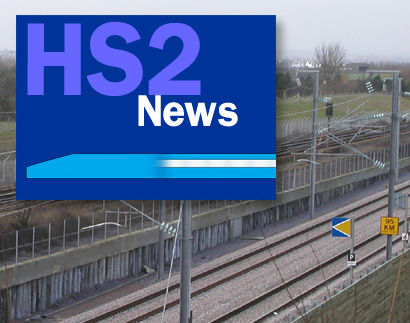OFFICIAL forecasts of the business case for HS2 have been revised upwards, accompanied by a prediction that they are 'very conservative', although opponents of the project are claiming that only a small minority of the public are in favour of it.
In a parallel development, the prime minister has unveiled plans to limit the use of judicial reviews which are intended to thwart or delay major infrastructure projects, even as five HS2 opponents prepare for a judicial review in the High Court in early December.
This comes as the Department for Transport is finalising its plans for the next stage of HS2, taking the network to the North West, the East Midlands and Yorkshire.
The DfT’s announcement about Stage 2 is expected before the end of the year, and has been foreshadowed several times by Patrick McLoughlin since he became transport secretary in September. If it goes ahead, he will have fulfilled his predecessor Justine Greening’s ambition of accelerating the HS2 project by a full year and is also in line with his announcement at the Tory Party conference in September that he wanted to ‘fast track’ the scheme.
Stage 2 of HS2 will see detailed alignments unveiled for routes north of Lichfield, Staffs. A North West arm will serve Manchester and rejoin the West Coast Main Line to enable ‘classic compatible’ services to continue to Lancashire, Cumbria, Glasgow and Edinburgh.
It is believed HS2 will also serve Crewe, following a major campaign by pop impresario Pete Waterman who also runs a rail engineering business in the town and is a leading member of the Cheshire and Warrington Local Enterprise Partnership.
A second arm of HS2 will run from Lichfield to serve the East Midlands, the Sheffield city region and Leeds, together with a link to the East Coast Main line south of York so that ‘classic compatible’ trains can continue to Newcastle-upon-Tyne and Edinburgh.
Douglas Oakervee, chairman of the Government-owned company HS2 Ltd which has been preparing the plans, said: “The die is now cast for there to be two consecutive hybrid Bills to authorise the whole HS2 network.”
HS2 Ltd has built up a substantial team of 1,400 full-time staff to work on both stages of the project, assisted by a significant range of specialist engineering and environmental consultants.
The first Bill, embracing the route from London to Lichfield with a spur into Birmingham city centre and a link across North London to HS1, will be laid before Parliament within a year with the aim of having it passed by both MPs and Lords before the general election in 2015. After that a second Bill will follow in the next Parliament, based on details to be finalised after public consultation on the Stage 2 proposals.
Douglas Oakervee said completion of stage 2 will significantly improve the business case for HS2, about which there has been much argument with opponents.
The benefit-to-cost ratio of the first stage is now put at 1.7 and this improves to 2.5 with phase 2. He said: “We are quite confident these figures are correct – and that they are very, very conservative."
However, opponents are still rejecting the official case for the project. One leading opponent, Joe Rukin, claimed his stance was justified by the results of an Ipsos MORI survey which reports that 4 per cent of those asked said HS2 was a priority.
Building homes was the most popular choice with 40 per cent, followed by improving existing road infrastructure (20 percent), and improving existing rail infrastructure (14 per cent).
Mr Rukin said: "The results of this survey are no surprise to us. For three years Governments have allowed themselves to be seduced by the idea of high-speed rail, as sold to them by lobbyists from vested interest groups. They have totally lost sight of what the public know is really needed to get Britain going again, which is not chucking billions into an unstrategic, unjustifiable, unenvironmental black hole vanity project which will only be any use to the richest in society."
___________________________________________________________
"The anti-HS2 brigade is at it again — asking a selective question
and then interpreting the answers to promote its own ends."
Another view – in the Railnews Blog


